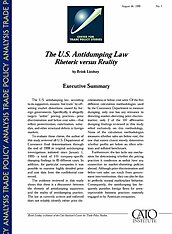Representatives of the 134 member nations of the World Trade Organization will meet in Seattle in November 1999 to launch the newest round of multilateral trade negotiations. The new round should be seen as a “bottom-up” process in which countries liberalize, not merely to gain “concessions” from other countries, but primarily to reap the economic rewards of their own liberalization.
The emphasis of the new round should be on reducing trade barriers; the greatest potential for economic gains is in services and agriculture. The United States should seek the global elimination of agricultural export subsidies, a drastic decline in domestic price supports, and a steep cut in trade barriers, especially the tariff spikes that protect certain favored farm sectors. In services, which now account for almost a quarter of global trade, barriers to foreign competition should be lowered across sectors, with exceptions kept to a minimum.
Trade barriers against manufactured goods should be lowered aggressively, with tariffs now below a 5 percent tariff rate reduced to zero and higher tariff spikes reduced to 5 percent and eventually phased out. All duties on information technology should be eliminated and international commerce on the Internet kept duty-free. Advanced economies must keep their commitments to phase out all textile and apparel quotas by 2005. WTO rules on antidumping should be tightened to prevent such laws from being abused for protectionist purposes. The WTO’s dispute settlement mechanism, although on the whole a tremendous success, is in need of reform with respect to the enforcement of WTO rulings. Specifically, countries that refuse to implement adverse rulings should be required to offer offsetting liberalization rather than be subject to trade-restricting sanctions.
No compelling need exists for adding foreign investment and intellectual property rights to the WTO agenda, given existing WTO rules and ongoing unilateral reforms. The new round of talks should avoid entirely competition policy and the enforcement of environmental and labor standards, which could threaten to overwhelm the WTO administratively while broadening the scope for sanctions.

This work is licensed under a Creative Commons Attribution-NonCommercial-ShareAlike 4.0 International License.

